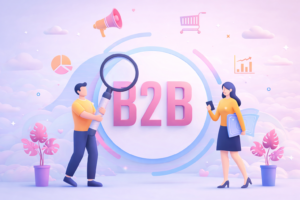The modern business environment is hectic and competitive, and therefore, the success of a business is determined by how well the company handles its customer relationships.
The consumers of the modern world want to receive fast answers, an individual approach, and the ability to communicate through various channels.
These interactions are time-consuming and prone to errors when handled manually. At this point, Customer Relationship Management (CRM) software is necessary.
An effective CRM system assists organizations in centralization of customer information, mechanization of operations, and enhanced communication, which will enhance stronger association, enhanced decision-making, and sustainable development in a marketplace that is customer-focused.
Understanding CRM Software
CRM programs are online applications that assist companies in operating and dealing with their existing as well as prospective customers.
It serves as a central repository where valuable information like contact details, history of communications, purchase history, preferences, and feedback is stored.
The main aim of CRM software is to make each customer contact, be it sales, marketing, or support, organized, tracked, and optimized.
This will enable companies to deliver personalised and seamless experiences throughout the customer experience.
CRM software includes some of the following major features:
Contact Management: It is a database that holds all the customer and lead information in one database, and thus, it is easy to keep track of the information as well as update it.
Sales Tracking: Monitors sales pipeline, lead tracking, opportunity tracking, and gives insight into sales data.
Customer Service: Assists teams in managing support tickets effectively, service history tracking, and response time.
Analytics and Reporting: Produces useful reports that assist the management in knowing how customers behave, the effectiveness of campaigns and trends in sales.
The Importance of CRM Software in Modern Business
Centralizes Customer Data
Centralization of customer data is one of the greatest benefits of CRM software. Businesses can store all the information about customers in a single secure platform as opposed to using several spreadsheets or files scattered around.
This central database will make sure that all departments, such as sales and marketing, customer services, and others, can access the right information that is updated.
This leads to more efficient work by teams and a more integrated experience for customers.
Improves Customer Communication
CRM software improves the process of business communication with customers. Following the previous engagement and the customer preferences, companies will be able to personalize their communication, be it in the form of follow-up emails, promotional offers, and service updates.
The automated reminders and scheduled messages are used to ensure that there are no customers who will be left without, and the omnichannel communication (through the phone, email, chat, or social media) allows for seamless connection across platforms.
Enhances Sales and Marketing Efficiency
CRM software is a priceless asset to the sales and marketing teams. It assists in tracing leads along the sales pipeline, campaign management, and conversion rates.
The features of marketing automation enable companies to divide audiences, develop personal campaigns, and cultivate leads.
The sales teams have the advantage of having real-time data on pipeline performance and customer purchase trends that will enable them to focus on leads and close deals quickly.
Data-Driven Decision Making
CRM software has become extremely useful in providing robust analytics capabilities to convert raw customer data into actionable data.
Companies can see the sales pattern, recognize their high-value customers, and the performance of their campaigns, all under the same roof.
Having this knowledge, managers will be able to make wise choices, anticipate demand in the future, and streamline business plans.
The use of data-driven decisions is not only able to reduce risks but also maximize the return on investment (ROI).
Better Customer Support and Retention
Customer service is very important in retaining customers. CRM system ensures that service teams are able to access a history of a customer in a quick manner and therefore, are able to solve problems in an efficient and professional manner.
It is also beneficial in identifying the recurring issues and monitoring the quality of services in the long run.
A satisfied customer will be more loyal, will spread the word about your brand, and will bring long-term business success.
Benefits of Adopting a Powerful CRM System
Increases Productivity and Efficiency
CRM software saves the employees’ time by automating repetitive job tasks like data entry, follow-ups, and reporting.
The teams can concentrate on value activities such as developing leads and enhancing customer relationships.
Also, automation reduces human error, which guarantees a less complex and more accurate workflow.
Higher Customer Satisfaction
When a business gets to know the needs and preferences of its customers, it will be able to provide more applicable and timely solutions.
CRM software facilitates personal experiences, which result in better customer satisfaction and customer loyalty.
The customer journey is also increased by such features as chatbots, instant support tracking, and personalized recommendations.
Scalable Growth
The interaction with customers is becoming a complicated affair as businesses grow. A strong CRM solution is a scalable one; it expands together with your organization.
A CRM can expand as your needs evolve without having to compromise on its performance, whether you are a small business with a few hundred clients or a large business with millions of customer records.
Improves Collaboration
CRM systems eliminate departmental boundaries by offering a common perspective of the customer interaction.
The sales, marketing, and support teams can easily work together, update in real time and work together in achieving common goals.
Such cooperation contributes to better functioning and a common strategy of interaction with clients.
How to Choose the Right CRM Software
The choice of the appropriate CRM system is one of the most important decisions that may have a considerable influence on the business performance.
The following are some of the considerations that you can make:
- Business Size and Type: Select a CRM that suits your company structure. Small companies might be interested in small and simple solutions, whereas bigger companies may require enterprise-based systems with lots of features.
- Integration with Existing Tools: Make sure the CRM can integrate with tools that your people are already using, e.g., email, enterprise resource planning, marketing automation tools, or customer support tools.
- Ease of Use and Customization Options: The CRM must be easy to operate, and it must be customizable to fit into your working processes and business model.
- Cloud vs. On-Premise Setup: Cloud-based CRMs are more flexible and are accessible, whereas on-premise systems are more controllable and secure, with more available options depending on your operational priorities.
- Pricing and Scalability: Check how the pricing system (subscription or a one-time payment) works and ensure that the system will be able to scale as your business expands.
Conclusion
The selection of the appropriate CRM software would be crucial in enhancing business efficiency and growth.
The factors that businesses need to consider when choosing a system include size, type, and operational needs.
The CRM should also be seamless with the current tools and easy to use, with the ability to be customized to fit workflows.
Businesses are also supposed to consider the option of using cloud-based or on-premises solutions. Lastly, think about pricing, scalability, and make use of demos or free trials to make the CRM match the long-term objectives.








